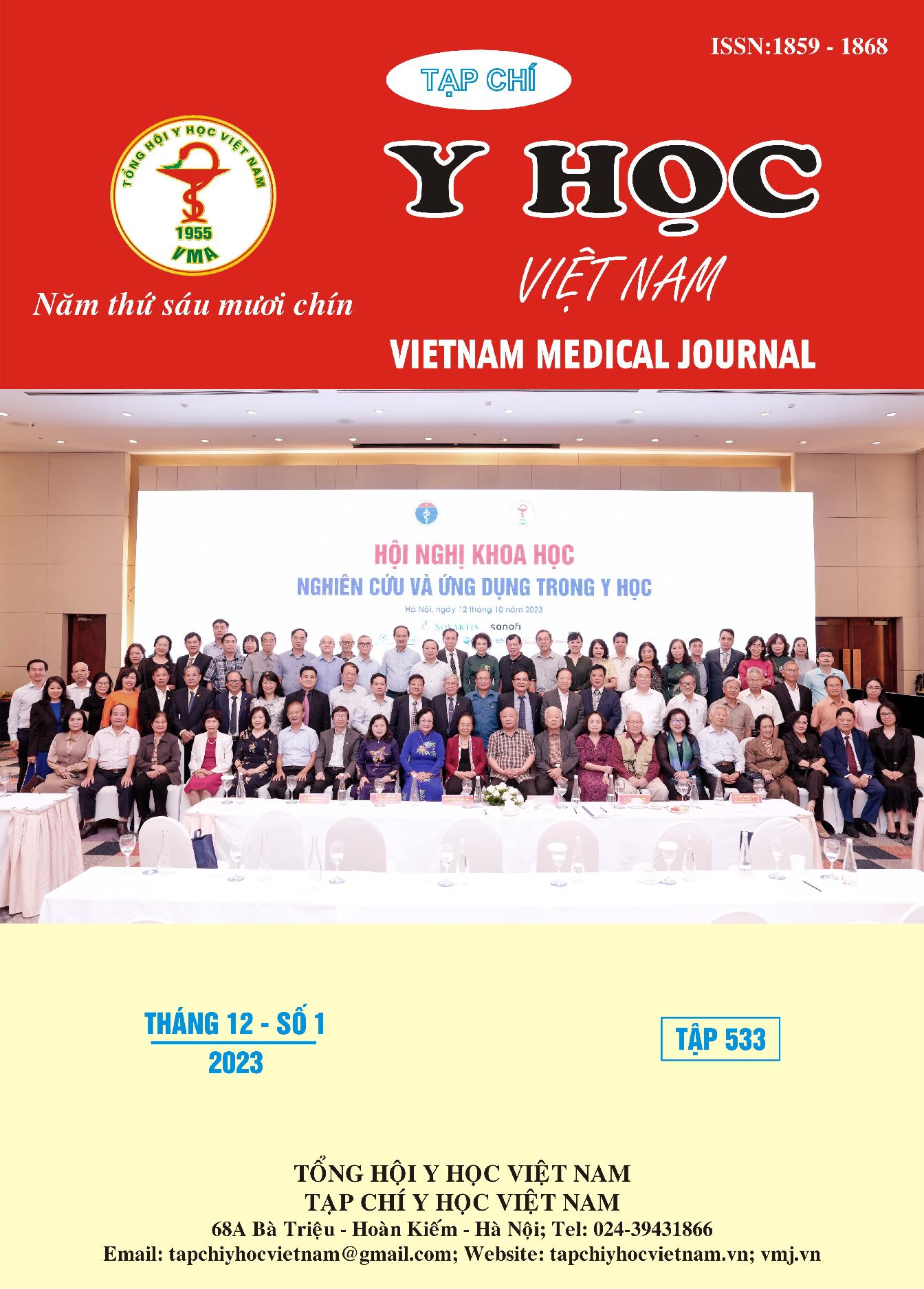MÔ TẢ TÁC DỤNG KHÔNG MONG MUỐN CỦA KÍCH THÍCH TỪ XUYÊN SỌ Ở NGƯỜI BỆNH TÂM THẦN PHÂN LIỆT THỂ PARANOID ĐIỀU TRỊ NỘI TRÚ
Nội dung chính của bài viết
Tóm tắt
Mục tiêu: Mô tả tác dụng không mong muốn của kích thích từ xuyên sọ trong điều trị người bệnh tâm thần phân liệt thể paranoid điều trị nội trú. Đối tượng: 104 người bệnh chẩn đoán tâm thần phân liệt theo ICD 10. Phương pháp: Can thiệp lâm sàng trên 104 người bệnh tâm thần phân liệt thể paranoid trong đó 33 người bệnh được can thiệp bằng thuốc kết hợp đủ kích thích từ xuyên sọ, 32 người bệnh được can thiệp bằng thuốc kết hợp không đủ liệu trình kích thích từ xuyên sọ tại vị trí vỏ não thái dương đỉnh trái (90% MT, 1 Hz, chuỗi xung 1200s, thời gian nghỉ giữa 2 chuỗi xung 0s, 19’59 phút một buổi điều trị, 12 buổi, 2 lần trong ngày cách nhau 5 giờ và 39 người bệnh dùng thuốc đơn thuần. Kết quả: Có 33.3% có các tác dụng không mong muốn trong đó hay gặp nhất là giật cơ đầu mặt cổ (23.5 %), tiếp sau đó là đau răng (20.6%), đau đầu thoáng qua (18.2%), giật cơ ngón tay (12.2%), đau tại nơi tiếp xúc (12.1%). Có 1 người bệnh gặp tác dụng không mong muốn nghe kém (3%), 1 người bệnh bị đau cổ (3%), 1 người bệnh chóng mặt (3%). Không có người bệnh nào bị co giật, bỏng da, khó tập trung và khó thở, ngất, ngứa ran, hưng phấn thoáng qua và các tác dụng không mong muốn khác. Đối tượng nghiên cứu gặp tác dụng không mong muốn giật cơ đầu mặt cổ ở 4 buổi điều trị đầu tiên tỷ lệ cao nhất buổi 1 (7.6%), giật cơ ngón tay cao nhất buổi 1 (3%), đau răng cao nhất buổi 4 (9.3%), đau đầu thoáng qua cao nhất buổi 2 (7.8%). Các tác dụng không mong muốn phân bố chủ yếu nhóm tuổi 20-44 tuổi cao nhất nhóm này là tác dụng không mong muốn đau răng và đau đầu thoáng qua đều 57.1%, tuy nhiên có sự khác biệt giữa triệu chứng khác nhau, thấp nhất ở nhóm nhỏ hơn 20 tuổi và một số ít ở nhóm trên 45 tuổi. Kết luận: Tác dụng không mong muốn khá thường gặp nhưng ở mức độ nhẹ xảy ra trong khi làm kích thích từ xuyên sọ, trong đó hay gặp nhất là giật cơ đầu mặt cổ, tiếp sau đó là đau răng, đau đầu thoáng qua, giật cơ ngón tay, đau tại nơi tiếp xúc. Có 1 người bệnh gặp tác dụng không mong muốn nghe kém, 1 người bệnh bị đau cổ, 1 người bệnh chóng mặt. Không có người bệnh nào bị co giật, bỏng da, khó tập trung và khó thở, ngất, ngứa ran, hưng phấn thoáng qua và các tác dụng không mong muốn khác. Các tác dụng không mong muốn gặp nhiều nhất ở các buổi đầu, sau đó giảm dần các buổi sau, phân bố tương đối đồng đều ở hai giới, tuy nhiên các triệu chứng giật cơ đầu mặt cổ, giật cơ ngón tay, đau răng, đau đầu thoáng qua, đâu cổ nhiều hơn nam giới, các triệu chứng nghe kém, chóng mặt gặp ở nữ giới, có xu hướng tập trung chủ yếu nhóm tuổi 20-44 tuổi và không gặp tác dụng không mong muốn nghiêm trọng nào.
Chi tiết bài viết
Tài liệu tham khảo
2. Klomjai W, Katz R, Lackmy-Vallée A. Basic principles of transcranial magnetic stimulation (TMS) and repetitive TMS (rTMS). Ann Phys Rehabil Med. 2015;58(4):208-213. doi:10.1016/ j.rehab.2015.05.005
3. Cole JC, Green Bernacki C, Helmer A, Pinninti N, O’reardon JP. Efficacy of Transcranial Magnetic Stimulation (TMS) in the Treatment of Schizophrenia: A Review of the Literature to Date. Innov Clin Neurosci. 2015;12(7-8):12-19.
4. Nguyễn VP, Nguyễn VT. hiệu quả điều trị trầm cảm bằng kích thích từ xuyên sọ tại bệnh viện lão khoa trung ương. Tạp Chí Học Việt Nam. 2021;506(2). doi:10.51298/ vmj.v506i2.1242
5. Overvliet GM, Jansen RAC, van Balkom AJLM, et al. Adverse events of repetitive transcranial magnetic stimulation in older adults with depression, a systematic review of the literature. Int J Geriatr Psychiatry. 2021;36(3):383-392. doi:10.1002/gps.5440
6. Slotema CW, Blom JD, Hoek HW, Sommer IEC. Should we expand the toolbox of psychiatric treatment methods to include Repetitive Transcranial Magnetic Stimulation (rTMS)? A meta-analysis of the efficacy of rTMS in psychiatric disorders. J Clin Psychiatry. 2010;71(7):873-884. doi:10.4088/JCP.08m04872gre


